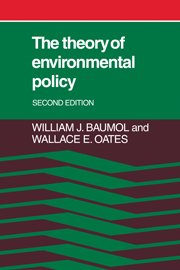Book contents
- Frontmatter
- Contents
- Preface to the second edition
- Preface to the first edition
- 1 Introduction: economics and environmental policy
- PART I On the theory of externalities
- PART II On the design of environmental policy
- 10 Introduction to Part II
- 11 Efficiency without optimality: the charges and standards approach
- 12 Marketable emission permits for protection of the environment
- 13 Stochastic influences, direct controls, and taxes
- 14 Taxes versus subsidies: a partial analysis
- 15 Environmental protection and the distribution of income
- 16 International environmental issues
- 17 National or local standards for environmental quality?
- Index
17 - National or local standards for environmental quality?
Published online by Cambridge University Press: 05 June 2012
- Frontmatter
- Contents
- Preface to the second edition
- Preface to the first edition
- 1 Introduction: economics and environmental policy
- PART I On the theory of externalities
- PART II On the design of environmental policy
- 10 Introduction to Part II
- 11 Efficiency without optimality: the charges and standards approach
- 12 Marketable emission permits for protection of the environment
- 13 Stochastic influences, direct controls, and taxes
- 14 Taxes versus subsidies: a partial analysis
- 15 Environmental protection and the distribution of income
- 16 International environmental issues
- 17 National or local standards for environmental quality?
- Index
Summary
The preceding chapter explored the difficult issues that arise for the design of environmental policy in an international setting, issues whose source is, in part, the absence of an international agency with the authority to make decisions that can internalize the costs that nations impose on one another. This chapter returns to purely domestic issues, concerning itself with the choice of the appropriate authority for environmental decision-making. In particular, we ask whether it is preferable to delegate the determination of standards for environmental quality to regional (or “local”) governments or to rely on a national environmental agency to set uniform standards for environmental quality that apply throughout the nation.
Current policy exhibits considerable ambivalence on this matter. In the United States, for example, the Congress, under the Clean Air Act, directed the U.S. Environmental Protection Agency to set national standards for ambient air quality. The EPA responded by defining maximum allowable concentrations for six so-called “criteria” air pollutants applicable to all areas of the country. In contrast, under the Clean Water Act, the individual states have responsibility for setting water quality standards. U.S. policy thus relies on uniform national (minimum) standards for air quality, but state-specific standards for water quality. Which approach, a national or a decentralized determination of environmental standards, is the appropriate one?
The results of this chapter suggest that the answer to this question is not simply one or the other approach. Instead, the analysis points to the need both for centralized and decentralized participation in the setting of environmental standards.
- Type
- Chapter
- Information
- The Theory of Environmental Policy , pp. 284 - 296Publisher: Cambridge University PressPrint publication year: 1988



